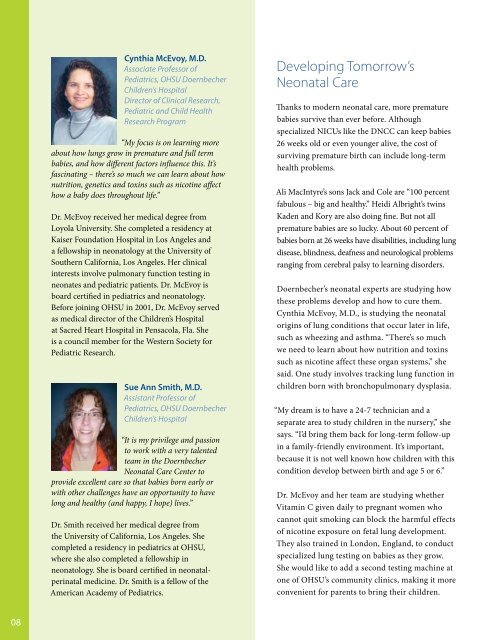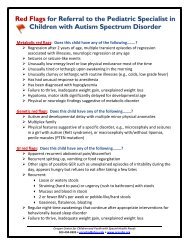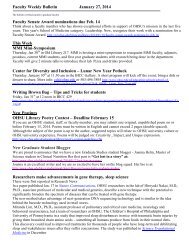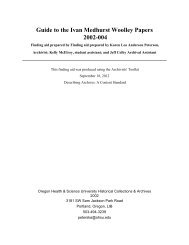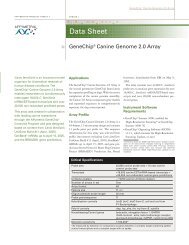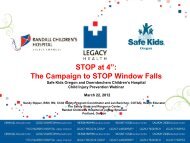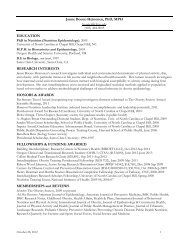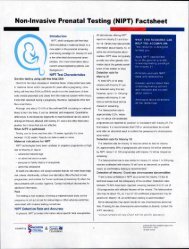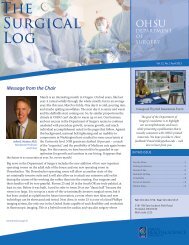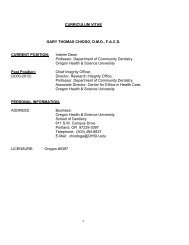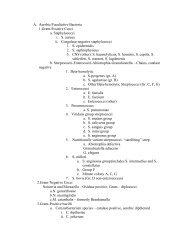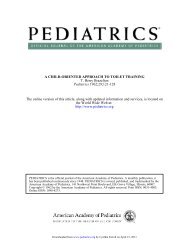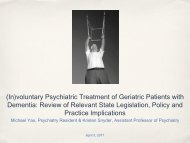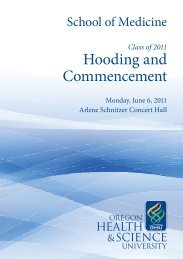Doernbecher neonatal Care Center Give Vulnerable PatientS The
Doernbecher neonatal Care Center Give Vulnerable PatientS The
Doernbecher neonatal Care Center Give Vulnerable PatientS The
You also want an ePaper? Increase the reach of your titles
YUMPU automatically turns print PDFs into web optimized ePapers that Google loves.
08<br />
Cynthia McEvoy, M.D.<br />
Associate Professor of<br />
Pediatrics, OHSU <strong>Doernbecher</strong><br />
Children’s Hospital<br />
Director of Clinical Research,<br />
Pediatric and Child Health<br />
Research Program<br />
“My focus is on learning more<br />
about how lungs grow in premature and full term<br />
babies, and how different factors influence this. It’s<br />
fascinating – there’s so much we can learn about how<br />
nutrition, genetics and toxins such as nicotine affect<br />
how a baby does throughout life.”<br />
Dr. McEvoy received her medical degree from<br />
Loyola University. She completed a residency at<br />
Kaiser Foundation Hospital in Los Angeles and<br />
a fellowship in neonatology at the University of<br />
Southern California, Los Angeles. Her clinical<br />
interests involve pulmonary function testing in<br />
neonates and pediatric patients. Dr. McEvoy is<br />
board certified in pediatrics and neonatology.<br />
Before joining OHSU in 2001, Dr. McEvoy served<br />
as medical director of the Children’s Hospital<br />
at Sacred Heart Hospital in Pensacola, Fla. She<br />
is a council member for the Western Society for<br />
Pediatric Research.<br />
Sue Ann Smith, M.D.<br />
Assistant Professor of<br />
Pediatrics, OHSU <strong>Doernbecher</strong><br />
Children’s Hospital<br />
“It is my privilege and passion<br />
to work with a very talented<br />
team in the <strong>Doernbecher</strong><br />
Neonatal <strong>Care</strong> <strong>Center</strong> to<br />
provide excellent care so that babies born early or<br />
with other challenges have an opportunity to have<br />
long and healthy (and happy, I hope) lives.”<br />
Dr. Smith received her medical degree from<br />
the University of California, Los Angeles. She<br />
completed a residency in pediatrics at OHSU,<br />
where she also completed a fellowship in<br />
neonatology. She is board certified in <strong>neonatal</strong>perinatal<br />
medicine. Dr. Smith is a fellow of the<br />
American Academy of Pediatrics.<br />
Developing Tomorrow’s<br />
Neonatal <strong>Care</strong><br />
Thanks to modern <strong>neonatal</strong> care, more premature<br />
babies survive than ever before. Although<br />
specialized NICUs like the DNCC can keep babies<br />
26 weeks old or even younger alive, the cost of<br />
surviving premature birth can include long-term<br />
health problems.<br />
Ali MacIntyre’s sons Jack and Cole are “100 percent<br />
fabulous – big and healthy.” Heidi Albright’s twins<br />
Kaden and Kory are also doing fine. But not all<br />
premature babies are so lucky. About 60 percent of<br />
babies born at 26 weeks have disabilities, including lung<br />
disease, blindness, deafness and neurological problems<br />
ranging from cerebral palsy to learning disorders.<br />
<strong>Doernbecher</strong>’s <strong>neonatal</strong> experts are studying how<br />
these problems develop and how to cure them.<br />
Cynthia McEvoy, M.D., is studying the <strong>neonatal</strong><br />
origins of lung conditions that occur later in life,<br />
such as wheezing and asthma. “<strong>The</strong>re’s so much<br />
we need to learn about how nutrition and toxins<br />
such as nicotine affect these organ systems,” she<br />
said. One study involves tracking lung function in<br />
children born with bronchopulmonary dysplasia.<br />
“My dream is to have a 24-7 technician and a<br />
separate area to study children in the nursery,” she<br />
says. “I’d bring them back for long-term follow-up<br />
in a family-friendly environment. It’s important,<br />
because it is not well known how children with this<br />
condition develop between birth and age 5 or 6.”<br />
Dr. McEvoy and her team are studying whether<br />
Vitamin C given daily to pregnant women who<br />
cannot quit smoking can block the harmful effects<br />
of nicotine exposure on fetal lung development.<br />
<strong>The</strong>y also trained in London, England, to conduct<br />
specialized lung testing on babies as they grow.<br />
She would like to add a second testing machine at<br />
one of OHSU’s community clinics, making it more<br />
convenient for parents to bring their children.


